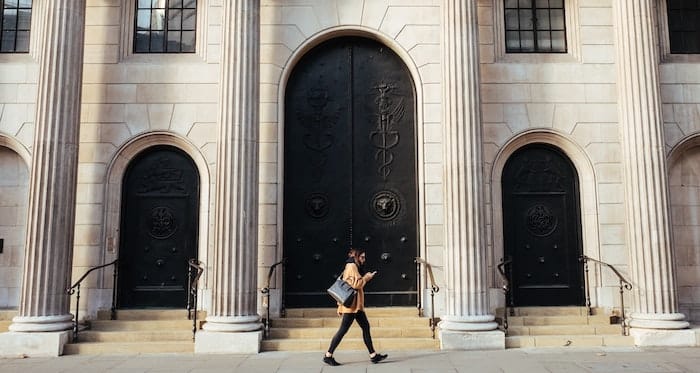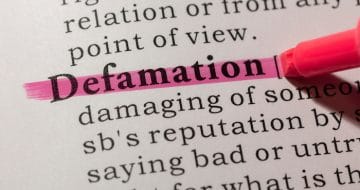Legal Cheek’s William Holmes explores the constitutional arguments surrounding the central bank independence in the wake of the mini-budget fiasco

“I want the bank to be more in the hands of the government but not too much,” remarked Napoleon Bonaparte in 1806 on the subject of central bank independence.
In his 1962 essay that asked ‘Should There Be an Independent Monetary Authority?’, Milton Friedman confirmed the French autocrat’s beliefs by highlighting how central bank independence was only possible “so long as there has been no real conflict between them and the rest of the government”. Indeed, he viewed such a technocracy as intolerable in a democracy.
That brings us to the day before the mini-budget when Bank of England policymaker and member of Monetary Policy Committee that sets the UK interest rates Jonathan Haskel said:
“We are in a difficult, uncomfortable position, frankly, because I don’t like being in a situation where you have one institution — namely the independent central bank — at least being portrayed as set against another institution, the elected government”.
Haskel is, of course, keenly aware of the constitutional role of the Bank of England.
In its current form that has existed since the passing of the Bank of England Act 1998, the Bank of England is supposed to enjoy operational independence (acting through its three committees, it may use the tools it deems necessary to achieve a desired outcome), political independence, and financial and economic independence.
The government, however, defines the Bank’s objectives — at present, the government has set a target inflation rate of 2%.
The Treasury also possesses certain statutory powers over the Bank’s decisions and members of the Bank regularly appear in front of the House of Commons Treasury Committee as a demonstration of public accountability.
What’s all this independence for?
The aim is to separate out responsibility for monetary policy and fiscal policy in order to prevent myopic governments from deploying dangerously expansionary policies, running their economies hot as they head into an election where their economic strategy will come under public scrutiny. In the language of constitutional law, the phenomenon is an example of the separation of powers.
Whereas a government’s economic interests are structurally prone to endangering sound monetary policy, the independent bank navigates the ups and downs of economic cycles as guardians of financial stability.
As Friedman pointed out, everything is fine until there’s a clash. This could not be better showcased than by the situation caused by Kwarteng’s mini-budget — the very thing that left the Bank of England’s Haskel feeling “uncomfortable” .
The government, with a view to claiming a sound economic policy in the next election, aimed to avoid a recession by cutting taxes to stimulate growth — a more expansionary policy. The Bank of England, however, is aiming to reduce inflation in line with its 2% target. This will likely cause increased unemployment and even a recession as this will be achieved by raising interest rates which increases the cost of borrowing for businesses.
In a sentence, the government’s fiscal policy aimed to avoid recession, whilst the bank’s monetary policy was likely to induce a recession, thereby thwarting the government’s stated objectives.
Having been almost universally condemned as bad policy, the government has now U-turned on its mini-budget. But in such an “uncomfortable” clash, should the government give way to the independent Bank of England?
There is certainly an argument that the technocratic and unelected Bank of England should act deferentially to the government as a democratically elected body. Even if you do not like Liz Truss’s economic policy, one day you may find yourself politically in favour of a particular economic policy (say, one that promotes a green economy) that encounters difficulties owing to the actions of the central bank which deny democratic legitimacy.
Thus, central bank independence, to a certain extent, can stand for a distrust of democracy or even be considered to undermine democratic legitimacy.
However, in our current situation, it might be fair to point out that the extent to which Truss has true democratic legitimacy is questionable. But, besides this being weak grounds for the Bank of England being able undermine parliamentary democracy, that aspect of the UK’s political system is a topic for another day.
On the other hand, you could take the view that independent central banks are now so fundamental to modern society that they should be treated as one of the institutions to which governments should show deference. The famous economist Charles A.E. Goodhart considers this argument by analogising the importance of independent central banks to an independent judiciary.
There appears to be a deep historical connection that can be observed between the two institutions.
Historians have speculated on the limited evidence they have that the use of money as a form of restitution for criminal punishment proves that money is an essential foundation on which a stable society is built, rather than just an alternative to barter.
Examples of this are wide-ranging, from the medieval Wergild (the practice of awarding financial compensation for injustices done to an individual as opposed to resorting to violent feuds) and pre-Solon ancient Greek ‘debt slavery’ in a time where incarceration was not used as a punishment for criminal activity, amongst other examples.
Given this connection between money and social advancement, it could be argued that where there is the risk of a conflict of interests, monetary policy must be separated off and handed to an independent central bank.
It’s worth remembering how short-lived this “fascinating socio-economic experiment” has been. Following the hay days of the Great Moderation (mid-1980s-2007), the 2008 financial crisis, years of quantitative easing and now the onset of high inflation have left independent central banks are primed to fall on their swords.
Economic historians have argued that whenever such an independent central bank has seriously clashed with government policy or overseen a major economic crash, it has not remained independent for long.
In other words, independent central banks have historically been scapegoated and their functions assumed by governments in times of crisis. No wonder Napoleon wanted such institutions to be “more in the hands of the government but not too much”.
Independent central banks are certainly not as baked into our societies as an independent judiciary is. Central bank independence is a “nuanced and complex concept” with multi-faceted forms of independence that can be hard quantify (big personalities, for example, can have an important impact in spite of the institutional set-up) and that has adapted gradually.
As economies navigate the onset of an economic downturn, Haskel’s comments underline a vital self-consciousness: the constitutional position of central bank independence entails a democratic deficit that must be weighed up against its own value. If it does not pay off, is it worth price?


